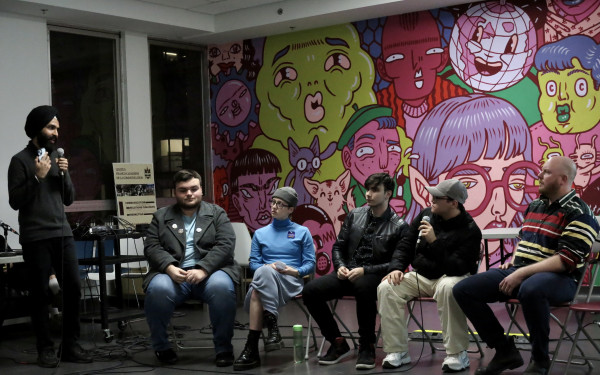May I Blank Your Blank?
Posters put up in the Hall building featuring a blackboard, two giggling cats and the word “pussy” were too much for someone at Concordia.
Their reaction was to tear them down. Twice.
“It makes me sad how ironic this is,” said Kota Harbron, a volunteer at the 2110 Centre for Gender Advocacy who put up the posters for a series of Radical Sexual Education seminars.
“The workshops were about having open conversations about sexual health, sex being fun and it being something you could talk and laugh about,” said Harbron. “But someone’s reaction was to silence them and tear them down.”
The workshops during the first week of February dealt with issues of consent, safe sex and communication.
“The moment I saw the posters, I thought to myself, ‘It’s going to be a pain in the ass to put these up,’ but I didn’t ask the designer to change anything,” said Harbron. “I thought it was completely adorable, fun, accessible and sex-positive.”
The trouble with the posters began when Harbron brought them to the Concordia Student Union to be stamped. All posters on billboards need to be approved by the CSU—this step is normally a formality, but Harbron found it to be anything but.
“The two secretaries that were there told me, ‘You put us in such a bad position, we don’t know what to do about this, if it were up to us we would say no because it will offend people.’ So they told me to leave the posters there,” said Harbron.
When the organizer got home, she found a voicemail waiting for her. The posters were rejected according to the voice on the line—Harbron would need to print a new batch without the word pussy. However, when she checked her email, she had another message from the CSU saying that a second opinion had reversed the decision.
“They told me, ‘It’s fine, but if we get any complaints you will need to change them,’ so I sent a thank you note before they could change their minds,” said Harbron.
The first batch of posters was put up during the last week of January, but when she checked them on Feb. 2, she noticed that they were all gone from the Hall building. She didn’t know if it was the CSU or irate students, but when she checked with the union she was told that they had received no complaints.
So she put up a second run of posters—they were all missing the next day.
While smaller runs of posters stayed up in the EV building and Loyola Campus, all of the posters in the well-travelled Hall building were removed.
Tom Waugh, a professor in the Mel Hoppenheim School of Cinema, doesn’t think that students are responsible for the disappearances.
“I don’t believe that some student vigilante group would organize and tear down the posters overnight. Twice,” said Waugh. “This sounds more like something the university would do.”
Concordia’s director of security and the dean of students were contacted for this piece. Neither of them had received a complaint about the posters or had any idea about what may have happened to them.
Calling the atmosphere at Concordia “tolerant and grown up,” Waugh felt that the content of the poster would be inoffensive to most students at the university.
“It’s completely innocuous and in fact it’s quite witty and smart,” said Waugh. “It’s strange that people would have been offended.” The professor has witnessed a long history of dealing with sex-related censorship at Concordia. “When we had our conference in 1998 about Sex on the Edge, we had a film still from the silent movie period with a side view of a nude women holding a big sword or scimitar,” said Waugh. “We learned later that the poster was brought up at an official meeting discussing the visual environment at Concordia. A senior university administrator held up the poster and said, ‘Here is what is permissible under the current standard at our institution.’ We got away with it.”
Ever since, the policy seems to have tightened—especially online. Concordia’s Communications Department maintains a strict control over images used online and refused to reprint posters when the Concordia Documentary Centre ran a series called Sex, Labour, Smut in 2009.
“Safer sex imagery bears the brunt of censorious policy generally, not just at Concordia,”
–Tom Waugh
Concordia Film Professor
In 2003, The Plant newspaper at Dawson College ran a cover with a penis and condom as part of a safe sex issue. The CEGEP’s administration removed the whole run of the newspaper, confiscating them from the school’s newsstands.
“Safer sex imagery bears the brunt of censorious policy generally, not just at Concordia,” said Waugh.
Until the 1980s, pornographic magazines brought from the U.S. into Canada had to have safer sex columns censored to pass through customs.
While the giggling cat posters were torn down in the Hall building, posters from the Arts and Science Federation of Associations showcasing two women in compromising positions wrestling in chocolate were allowed to stay up.
“The contradictions are rife in this campus environment,” said Waugh.
Concordia would seem to have a double standard, as the word “pussy” merited censorship, but nearly naked women wrestling in chocolate did not.
While ASFA eventually took down the posters due to complaints, Harbron ran out of time to reposter before the workshops. Only three showed up for the first workshop, but word of mouth spread and 10 were present for the second, while 25 attended the third.
This article originally appeared in Volume 31, Issue 23, published February 15, 2011.





_600_375_90_s_c1.jpg)
__600_375_s_c1.png)
